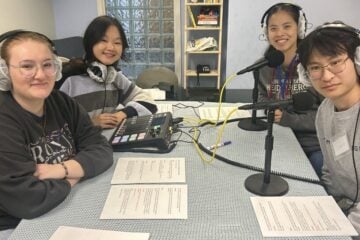OETA Foundation remains in network building despite eviction notice
The fundraising nonprofit embroiled in a legal dispute with Oklahoma’s public TV network defied an eviction notice to leave its office space within the public broadcaster’s headquarters in Oklahoma City.
On Dec. 14, the Oklahoma Educational Television Authority Board gave the foundation until Jan. 13 to remove its office and staff from the building. The foundation president told Current it has no reason to leave.
The sibling organizations have been battling to redefine the terms of their relationship in an internal squabble that hit the courts last month. The network board voted to cut ties with the foundation Jan. 8 and announced it would form a new fundraising nonprofit. Oklahoma Secretary of State documents show that new nonprofit, Friends of OETA, was incorporated Nov. 30.
OETA Foundation President Daphne Dowdy told Current that the organization was not vacating its offices because “we don’t have a lease with OETA.” Dowdy said the foundation “built our office decades ago.”
“We have maintained, insured and occupied our space since the 1980s,” without a lease, she said.
Dowdy also said the foundation will continue its fundraising work for OETA.
OETA’s action to sever ties with the organization “does not dissolve the foundation,” she said. “We are a separate, independent organization.”
OETA Executive Director Polly Anderson said in an email to Current that the network “will pursue all legal avenues to enforce the removal of the foundation.”
In a statement released earlier this month, OETA Board Chair Garrett King said it was unfortunate that OETA had to resort to evicting the foundation from its headquarters. “We were left with no other option after the OETA Foundation began changing locks, attempting to make alterations to OETA’s building, denying access to part of OETA’s building, interfering with day to day operations and attempting to hack OETA’s computer network,” he said.
This post has been updated with comment from Anderson.






I have no direct insight into thie battle between OETA and its foundation, but as someone who headed a support organization in Oregon and has consulted to public media organizations on these conflicts, I was disturbed to learn that the foundation had used contributed funds to produce a program for possible airing on OETA without consulting with them. It is not the role of a support organization to involve itself in programming decisions. That role, under FCC rules, rests solely with the licensee. If the facts are as presented, OETA had not just the right, but the responsibility to insist on clarifying roles. If the foundation resisted effort, OETA is right to sever the connection..
Unless their charter forbids it, I see nothing wrong with OETAF producing a program.
If they legally produce a program, I see nothing wrong with them offering it to OETA.
If, as you say, the licensee has the sole responsibility of what they broadcast, I see no problem with them turning it down.
Since OETA did broadcast it. I assume they did so responsibly.
From what I read, OETA wants sole and total control. If so, it should be totally funded by the State of Oklahoma with no funding by corporations or individuals and no oversight except by communications to legislators.
Unless their charter forbids it, I see nothing wrong with OETAF producing a program.
If they legally produce a program, I see nothing wrong with them offering it to OETA.
If, as you say, the licensee has the sole responsibility of what they broadcast, I see no problem with them turning it down.
Since OETA did broadcast it. I assume they did so responsibly.
From what I read, OETA wants sole and total control. If so, it should be totally funded by the State of Oklahoma with no funding by corporations or individuals and no oversight except by communications to legislators.
I appreciate your points. It should be kept in mind, though, that a support organization raises funds on behalf of the parent. Most keep their role as middleman transparent to the donor, making most contributors unaware of the distinction. They are giving to the licensees programming. When a support organization uses funds contributed in this way to pursue its own agenda, no matter how well-intentioned its aims, amounts to diverting funds. I headed the OPB Foundation, back when Oregon Public Broadcasting was a state agency. My background was in journalism. There were many topics in which I was personally interested, many that our board members wanted OPB to address, but the role of the Foundation was to providing private funding to OPB, not to establish a secondary program entity. In the case of the OETA Foundation’s programming, one must ask what would have happened had the network decided not to run the programming produced by the Foundation. Funds from donors intended to support OETA would have been diverted to a non-OETA purpose. It’s a slippery slope when a support organization loses sight of its purpose.
Thanks for the insight. I would be curious to know what type of programming the Foundation was trying to push? I agree that it would not be the role of the support foundation to begin producing content – that is beyond the scope of what they are charged to do – which is raise funds for the organization who IS responsible for content. Of course OETA would have the right to refuse to air content, but what portion of donated funds would be used to develop said content? I agree – slippery slope.